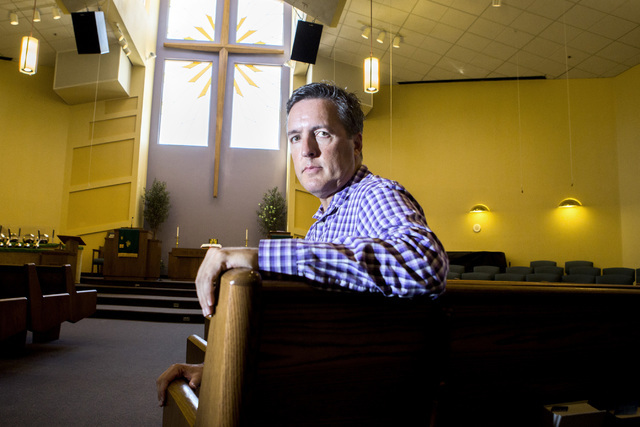Faith carries Las Vegas pastors through funerals for those they don’t know
Pastors play a vital role in times of grief. Providing a source of comfort, the church is a safe place to say goodbye to loved ones and members of the congregation.
But what happens if the pastor does not know the deceased well or at all? Friends and family want a funeral that is both personal and meaningful.
“First thing, I’m upfront with the family,” the Rev. David Dendy, pastor of Mountain View Presbyterian Church said. “I’m not going to pretend to know the deceased.”
Dendy said he approaches every service with two purposes in mind; to celebrate the life of the deceased and celebrate the promise found in Jesus Christ.
“Every service is about paying witness to the great celebration of the resurrection of that great promise,” said Dendy, who was ordained in 1988. “Jesus was raised from the dead and he promises he’ll do that for us as well. Because of that promise you don’t have to know the person to officiate a funeral.”
Since Dendy joined the church 15 months ago, he has conducted 15 funerals for people he didn’t know.
“I’ve grown more comfortable in that role officiating services for people I don’t know,” Dendy said. “Just because of that two-prong approach.”
Other valley ministers including Tom McCormick, small groups pastor at Hope Church of Las Vegas, and Tina Ana, associate pastor at the International Church of Las Vegas, popularly known as ICLV, approach funeral services in a similar fashion as Dendy, honoring the individual and celebrating God.
“This is a time of celebration,” said Ana, who’s been in ministry for 30 years. “A time of reflecting on what this person’s left behind, the good things they did. I have not been to a funeral where that’s not been the case.”
The process for Ana begins in prayer.
“By the time I meet with the family I’m already mentally preparing myself,” Ana said. “I’m praying asking God for wisdom.”
Each pastor’s common focus is a Christian-based service promising that the human soul is eternal and there is reunification in heaven.
“Christians are encouraged by God not to grieve without hope,” McCormick said. “Because we know that life isn’t over when life on earth is over.”
The primary difference between a service for someone the pastor knows and one they don’t is how much personalization they can add to the message, and the potential for strong emotion when discussing the life of someone they knew.
“These funerals for me aren’t any more difficult than for those of people I know,” McCormick said. “In fact, the people I am closest to are actually the most difficult for me because of my own personal emotion.”
Since Hope Church’s services are more standardized, it removes some of the challenges associated with unfamiliarity for McCormick.
“Remember, the funeral is not as much about the person as it is for the ones who are left on earth,” McCormick said, estimating 50 percent of the funerals he’s performed are for people he didn’t know. “We believe the focus of a funeral not only is to honor the person who is deceased but more importantly to honor God by ministering to those who are left to grieve.”
The first, and most important step, is meeting with the family to learn more about the individual and discuss the details of the service. Each pastor typically gives family members the freedom to determine how they want to celebrate their loved one and work in tandem with the family to create an individualized service.
“We always ask them what they want,” Ana said, who at that initial meeting asks questions about the deceased.
“We want to partner with them and make that last moment of saying goodbye the best it can possibly be for everyone involved.”
Once while officiating a funeral, Dendy learned about the deceased’s love for golf. For his closing remarks, he used the upcoming Master’s golf tournament as a comparison to walking up the last fairway in heaven to personalize his message.
“What I try to do when I meet with the family is pick one or two things I can run with as a theme,” Dendy said. “That also tie into the Christian faith and into the promise we will live forever.”
Neither Dendy nor Ana script anything prior to officiating the funeral.
Both provide time for others to share personal memories or remembrances during the service. This provides more information about the deceased so their sermon given later can be personalized.
“We try to get as much information as we can,” Ana said about the initial meeting with family. “But until you’re actually there and you hear what other people have to say about that person do you get more of a glimpse of who that person was.”
A pastor’s job extends beyond officiating the funeral for anyone they serve.
“You have to be willing to listen,” Ana said. “I will take everything else off my calendar for a family that is grieving. I’ll bring them into a room and let them talk as long as they need.”
“You can’t go wrong with compassion,” Ana added. “You can’t go wrong loving people where they are at, that goes a long way.”

















